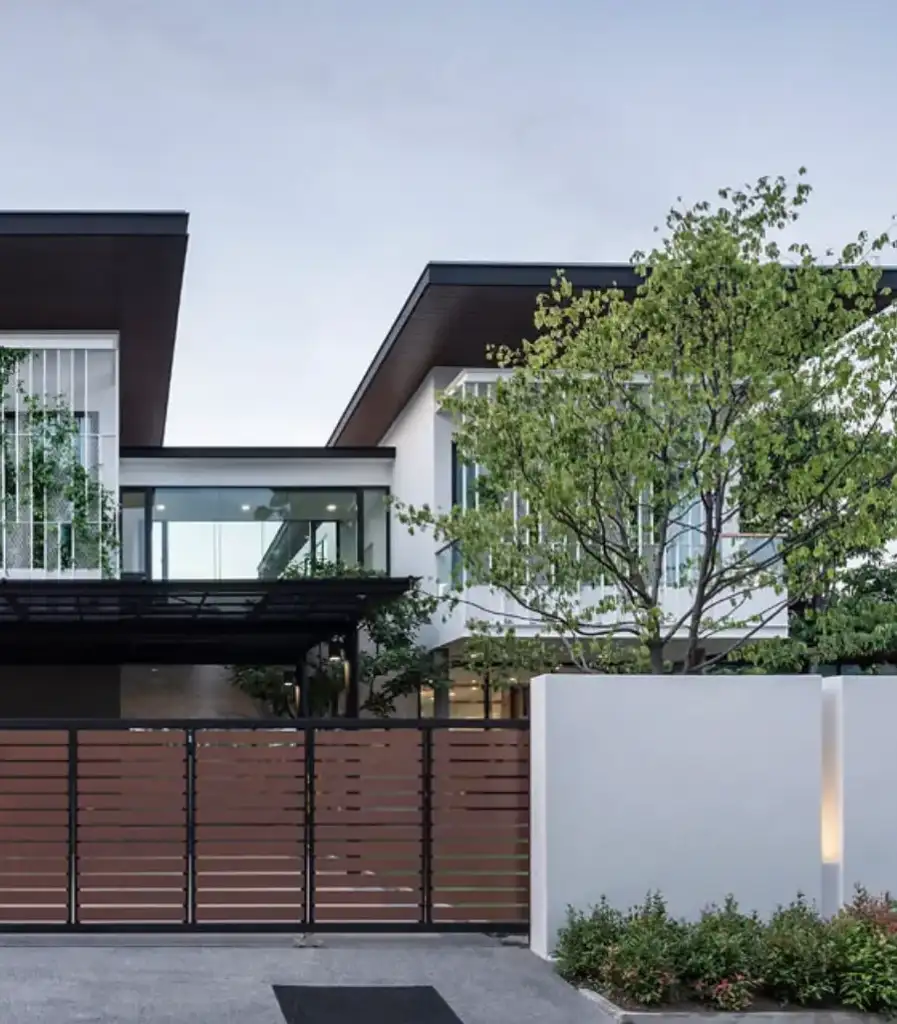- HOME
- FAQs
- NEWS & ADVICE
- Latest Blogs
- Buyer’s Guide
- How to Buy a House in Bang Kapi: A Buyer’s Guide
- How to Buy a Condo in Bangkok Off-Plan: Risks and Rewards
- Should I Buy Bangkok Condos with Freehold or Leasehold in 2025?
- 10 Things I Need to Know When Buying Bangkok Houses in 2025
- Should I Buy Bangkok Condos or Townhouses in 2025?
- Essential Guide for Bangkok Condo Ownership in 2025
- 10 Reasons to Read a Thailand Real Estate Blog
- Guide to Comparing Bangkok Condos Before You Buy
- 10 Reasons to Buy Bangkok Property in 2025
- Complete Guide to Buying Property in Thailand
- Things to Consider when Buying Brand New Bangkok Houses for Eco-Friendly Green Efficiency
- 30 Thai Property Laws You Need to Learn About
- Why Should I Buy Phrom Phong Bangkok Real Estate?
- How To Transfer Money Into Thailand to Buy Property?
- Should I Buy/Rent a Furnished or Unfurnished Bangkok Condo?
- Thailand Property: Buying Vs Renting
- Advantages and Disadvantages of Buying Bangkok Real Estate
- Should You Buy Bangkok Condos or Townhouses?
- What’s the Difference Between Thai Freehold and Leasehold Property Ownership?
- Common Issues Buying Property in Thailand
- Bangkok Real Estate: Buy or Rent? What Option is the Best?
- 4 Things Foreigners Should Do When Buying Bangkok Condos
- Ultimate Guide to Buying a Holiday Home in Thailand
- 4 Top Tips for Buying Bangkok Real Estate
- Understanding Bangkok Condo Ownership for Foreigners
- The Ultimate Bangkok Real Estate Buyer Q&A
- Stunning 4-Bedroom Bangkok House for Sale or Rent
- Buying Bangkok Condos or Houses? What’s the Best Choice?
- Bangkok Real Estate: Taking Advantage of a Buyers’ Market
- Bangkok Real Estate: Buy or Rent? What Option is the Best?
- Bangkok Real Estate Guide: Leasehold or Freehold?
- Landlord’s Guide
- Understanding Thailand Land & Building Tax – Bangkok Real Estate
- Landlord’s Guide to Renting Out Bangkok Condos
- 5 Reasons to Market Your Bangkok Property Listing with 360 VR Tours
- Best Bangkok Contractors Recommendation List
- How To Improve Your Bangkok Property Listing
- 5 Reasons to List Your Bangkok Condo for Sale with Us Today!
- Seller’s Guide
- Cool Tips for Selling Your Bangkok Condo Quicker in 2025
- Property Transfer Tax Calculator
- How to Sell Your Bangkok Property Faster?
- Understanding Taxes and Fees Before You Buy or Sell Property in Thailand
- Best Photo Tips for Selling Your Bangkok Property Quicker
- Getting Your Thailand Property Ready to Sell
- 5 Reasons to Use the Services of Bangkok Real Estate Agents
- 8 Top Tips for Selling Your Bangkok Property
- Free Property Valuation – Bangkok Guide
- 10 Tips to Improve Your Thai Property Sale Chances
- Tenant’s Guide
- Condo Rules and Culture in Bangkok: What Expats Need to Know
- Renting Condos in Ekkamai Bangkok! What Should I Know in 2025
- Essential Tips for Renting an Apartment in Bangkok in 2025
- Everything You Need to Know About Renting Bangkok Houses in Bangna
- Renting vs Buying a Condo in Bangkok: What’s Right for You?
- Top Tips for Finding Family Houses For Sale in Bangkok
- Renting Houses in Ekkamai: Everything You Need to Know
- Top-10 Tips for Finding the Best Bangkok Condos Rentals
- Find Rental Properties Near Wellington International College with Hero Realtor
- How to Rent a House Near Brighton College Bangkok
- 10 Reasons Why Living in Bangkok in 2025 is a Smart Move
- Comprehensive Guide for Renting Condos in Central Bangkok
- Top 10 Tips For Renting Houses in Bangkok
- Guide to Renting a Bangkok Condo in 2025
- Should I Use a Bangkok Real Estate or Go it Alone? The Value of a Professional Agent
- Advantages and Disadvantages of Living in a Bangkok Penthouse
- Beginners Guide to Renting a Thailand Property
- How to Find Bangkok Real Estate to Buy with Hero Realtor
- How to Rent a Property in Thailand as a Foreigner?
- 360 Virtual Tour Properties Gallery
- How to Find Bangkok Rental Properties with Hero Realtor
- Finding the Best Pet-Friendly Properties in Bangkok
- Find the Perfect Condo Rental or Sale with Bangkok 360 VR Tours
- 5 Affordable Bangkok Condo Rentals
- Live in Thailand: Bangkok Condo Rental Destination Guide
- Chinese Expat Guide
- Comprehensive Guide to Buying and Renting Luxury Homes in Srinakarin for the Chinese Community in Bangkok
- Best International Schools in Bangkok for Chinese Families
- China’s Young Families and the Rising Trend of International Schools in Thailand
- Chinese Expat Guide to Buying and Renting Luxury Bangkok Houses in Bang Na
- Chinese Expat Guide to Buying and Renting Bangkok Luxury Houses at Krungthep Kreetha
- Bangkok International Schools
- Wellington College International School Bangkok
- 5 Highly Recommended Bangkok International Schools
- Moving to Bangkok to Teach English at International Schools?
- Australian International School Bangkok (AISB)
- Bangkok International Preparatory & Secondary School
- Bangkok Patana School – British International Schools in Thailand
- Brighton College Bangkok
- Concordian International School Bangkok
- DBS Denla Ratchapreuk Bangkok International School
- Harrow International School Bangkok
- International Community School (ICS) – Bangkok Christian School
- King’s College International School Bangkok
- KIS International School Bangkok – Properties For Rent
- Lycée Français International de Bangkok
- NIST International School Bangkok – Properties to Rent
- Regent’s International School Bangkok
- Shrewsbury International School Bangkok
- Singapore International School of Bangkok @ Pracha Uthit
- Stamford International University Bangkok
- St Andrews International School Bangkok
- The American School of Bangkok – Properties For Rent
- The American School of Bangkok
- Verso International School Bangkok
- Wells International School Bangkok
- Bangkok Property Locations
- Here’s Why You Need to Rent Houses in Krungthep Kreetha Bangkok
- Discovering the Best Family-Friendly Neighborhoods in Bangkok
- Bangkok Condos for Rent Near Sukhumvit 77 On Nut (T77)
- 5 Things to Remember When Choosing a Bangkok Property Location
- Asoke Property Destination Guide
- Ekamai Bangkok Property Destination Guide
- Nana Bangkok Property Destination Guide
- Phloen Chit Bangkok Property Destination Guide
- Phra Khanong Bangkok Property Destination Guide
- Phrom Phong Bangkok Property Destination Guide
- Thonglor Property Destination Guide
- Live in Thailand: Bangkok Condo Rental Destination Guide
- Luxury Bangkok Condos at Quattro By Sansiri
- Exploring Urbana Sukhumvit 15 Condo Development in Bangkok
- Stunning Bangkok Condos @ 39 By Sansiri
- 5-Bedroom Family House for Sale/Rent near Brighton & Wellington Bangkok International Schools
- High-End Bangkok Condos for Rent at Phrom Phong
- Finding the Best HQ by Sansiri Condos for Rent and Sale
- Luxury Bangkok Properties: 6-Bed Kalista Condo for Sale and Rent
- Bangkok Condos for Rent Near EmQuartier Sukhumvit 39
- Immigration & Visa
- Commercial Properties
- Comparing Bangkok Retail Markets: Sukhumvit vs. Siam vs. Silom
- Top Tips for Renting Commercial Retail Property in Bangkok
- The Best Areas in Bangkok for Renting Office Space: A Business Guide
- Renting Office Space in Bangkok: What You Should Know in 2025
- Best Tips for Investing in Bangkok Commercial Office Space
- A Guide to Renting Commercial Space and Offices in Bangkok
- Buying Bangkok Shophouses to Convert into Businesses
- Bangkok Commercial Property Rentals: Thonglor Café/Restaurant for Rent
- Premium Centrally-Located Bangkok Office Space for Rent or Sale
- 3 Top-Notch Bangkok Commercial Properties for Sale or Rent
- Guide to Starting a Business in Thailand: Renting Bangkok Office Space
- Business Opportunity – Bangkok Hostel for Sale or Rent
- Industrial Properties
- Renting Bangkok Factories and Warehouses in 2025
- Bangkok Factory Rentals: Top Tips to Get the Best Deals in 2025
- Understanding Land Zoning in Thailand: Regulations and Rules in 2025
- How to Get a Factory License in Thailand?
- 12 Things You Need to Know Before Renting a Bangkok Factory for Cannabis Cultivation in 2025
- A Comprehensive Guide for Renting Bangkok Warehouses in 2025
- Honest Guide to Bangkok Mini-Factory and Warehouse Investments
- International Guide to Finding Warehouse Space in Thailand
- Rent Modern Samut Prakan Factory and Get a Free Factory License
- Understanding FDA & GMP Certification in Thailand to Ensure Quality and Safety
- Finding Cold Storage Warehouses and Clean Facilities in Bangkok
- 4 Things to Remember When Choosing a Thailand Factory to Buy
- How to Grow Cannabis in Thailand with a License?
- How to Get a Factory License in Thailand?
- 8 Things to Remember when Renting/Buying Warehouses in Thailand
- Buying and Renting Bangkok Warehouses for Legally Growing Cannabis
- Understanding Thailand Land & Building Tax – Bangkok Real Estate
- Ultimate Guide to Renting Industrial Properties in Thailand
- Affordable Factories and Bangkok Warehouses for Rent at Samut Prakan
- Massive Pathum Thani Electronics Factory for Sale or Rent in Bangkok
- Property Investment
- 5 Key Factors to Consider When Investing in Commercial Properties in Bangkok
- Exploring the Remarkable Advantages of Investing in Bangna Real Estate
- Understanding Bangkok Real Estate Market Trends in 2025
- Why Investing in Bangkok Property Now is a Great Idea?
- Buying Bangkok Off-Plan Condos Guide
- Buy a property with tenant
- Bangkok Real Estate Investment #1 – 4 Bed House for Sale with Tenants
- Bangkok Real Estate Investment #2 – Two-Bedroom Bangkok Condo for Sale
- ABOUT US
- CONTACT







